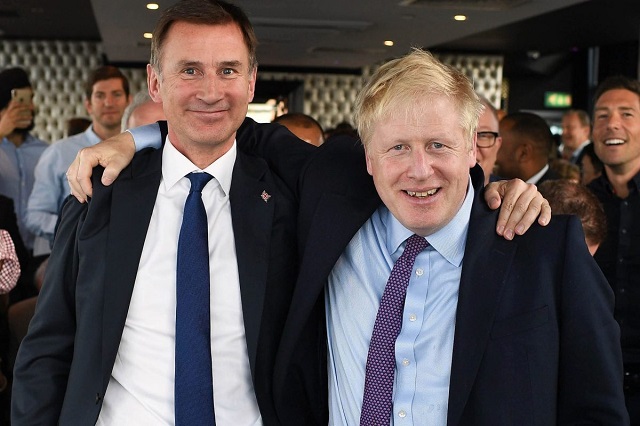Brothers in Arms Sales: Jeremy Hunt and Boris Johnson’s shameful record on Yemen Comment
New in Ceasefire, Politics - Posted on Tuesday, June 25, 2019 15:29 - 0 Comments
By Andrew Smith

The ongoing Tory leadership race is likely to dominate the headlines for the next few weeks. We’ll see the usual diet of big policy promises, regional photo-shoots and an endless array of speeches and interviews.
Despite the scrutiny, one word which is unlikely to be used by either Boris Johnson or Jeremy Hunt is Yemen. This comes despite the role that both men have played in exacerbating the worst humanitarian crisis in the world.
Over the last four years Saudi-led forces have unleashed a terrible bombardment on Yemen. The humanitarian cost has been appalling, with tens of thousands of people being killed and the widespread destruction of vital infrastructure across the country.
Many of the fighter jets, bombs and missiles that have been used in the war have been made here in the UK, with Johnson and Hunt having used their tenures at the Foreign Office to promote them. There is no doubt that these weapons have played a central role in the destruction. As former CIA analyst Brucie Riedel has said, “the Royal Saudi Air Force cannot operate without American and British support.”
Looking at Johnson first, he may have caused the Saudi regime some embarrassment in 2016 when he accused it of ‘puppeteering‘ and ‘twisting and abusing religion’ but he soon made up for it with a toadying visit to Riyadh and all the arms sales it could want.
A Freedom of Information request, seen by the Guardian, showed that in August 2016, Johnson signed off on the transfer of bombs only two days after Saudi forces had destroyed a food factory, killing 14 people. Twenty four hours after he had agreed to the sale, a school was bombed, killing 10 children.
Only two months later, Saudi forces bombed a funeral, killing 140 people. People around the world condemned the atrocity, but not even that was enough to deter Johnson from selling more bombs. Only weeks later he signed off on another arms transfer.
After leaving office, Johnson remained close to Saudi Royalty, enjoying £14,000 worth of hospitality in Riyadh shortly after his resignation. He was replaced at the Foreign Office by his leadership rival, Jeremy Hunt, who has improved on Johnson’s rhetoric, but for the large part has followed the exact same policies as his predecessor.
In 2018, the German Government suspended arms sales to the Saudi military. This followed the brutal murder of Jamal Khashoggi. No sooner had the decision been made and the German Government found itself under immense pressure from the pro-war lobby. Hunt joined their calls, writing to the German Government to urge it to maintain the sales in case it impacted on UK arms company profits.
This March, Hunt chose the fourth anniversary of the start of the bombing in Yemen to write a particularly awful article about it for Politico. Despite the devastating consequences of the war, Hunt used the piece to double-down on the arms industry agenda, arguing not just that arms sales were a good thing, but that it would be ‘morally bankrupt‘ to stop the sales. The same day his article was published, Saudi forces bombed a hospital, killing 8 people.
Last week, the Court of Appeal ruled that the process followed by the Government in licensing these arms was ‘irrational and unlawful.’ The landmark judgment, which followed a case brought by Campaign Against Arms Trade, will see a review of present arms sales and a halt on further sales.
The problem obviously goes wider than the views of individual Ministers such as Johnson and Hunt. Successive UK Governments of all political colours have offered the same unbending and uncritical political and military support for the Saudi dictatorship. However, that does not allow either man to abdicate themselves of responsibility for their role in exacerbating the crisis.
Regardless of who becomes the next PM, it is almost certain they will appoint Ministers who will continue to parrot their support for arms sales to Saudi Arabia. One thing that we can be sure of, whoever wins next month’s contest, it will make little difference in the palaces of Riyadh or those living under bombardment in Yemen.


Leave a Reply